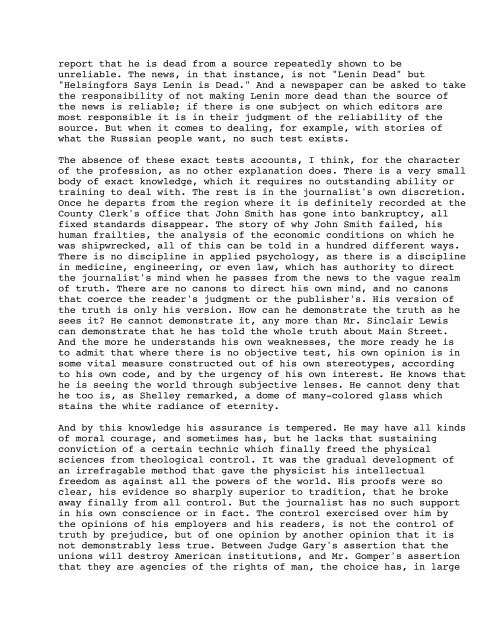PUBLIC OPINION by WALTER LIPPMANN TO FAYE LIPPMANN ...
PUBLIC OPINION by WALTER LIPPMANN TO FAYE LIPPMANN ...
PUBLIC OPINION by WALTER LIPPMANN TO FAYE LIPPMANN ...
You also want an ePaper? Increase the reach of your titles
YUMPU automatically turns print PDFs into web optimized ePapers that Google loves.
eport that he is dead from a source repeatedly shown to be<br />
unreliable. The news, in that instance, is not "Lenin Dead" but<br />
"Helsingfors Says Lenin is Dead." And a newspaper can be asked to take<br />
the responsibility of not making Lenin more dead than the source of<br />
the news is reliable; if there is one subject on which editors are<br />
most responsible it is in their judgment of the reliability of the<br />
source. But when it comes to dealing, for example, with stories of<br />
what the Russian people want, no such test exists.<br />
The absence of these exact tests accounts, I think, for the character<br />
of the profession, as no other explanation does. There is a very small<br />
body of exact knowledge, which it requires no outstanding ability or<br />
training to deal with. The rest is in the journalist's own discretion.<br />
Once he departs from the region where it is definitely recorded at the<br />
County Clerk's office that John Smith has gone into bankruptcy, all<br />
fixed standards disappear. The story of why John Smith failed, his<br />
human frailties, the analysis of the economic conditions on which he<br />
was shipwrecked, all of this can be told in a hundred different ways.<br />
There is no discipline in applied psychology, as there is a discipline<br />
in medicine, engineering, or even law, which has authority to direct<br />
the journalist's mind when he passes from the news to the vague realm<br />
of truth. There are no canons to direct his own mind, and no canons<br />
that coerce the reader's judgment or the publisher's. His version of<br />
the truth is only his version. How can he demonstrate the truth as he<br />
sees it? He cannot demonstrate it, any more than Mr. Sinclair Lewis<br />
can demonstrate that he has told the whole truth about Main Street.<br />
And the more he understands his own weaknesses, the more ready he is<br />
to admit that where there is no objective test, his own opinion is in<br />
some vital measure constructed out of his own stereotypes, according<br />
to his own code, and <strong>by</strong> the urgency of his own interest. He knows that<br />
he is seeing the world through subjective lenses. He cannot deny that<br />
he too is, as Shelley remarked, a dome of many-colored glass which<br />
stains the white radiance of eternity.<br />
And <strong>by</strong> this knowledge his assurance is tempered. He may have all kinds<br />
of moral courage, and sometimes has, but he lacks that sustaining<br />
conviction of a certain technic which finally freed the physical<br />
sciences from theological control. It was the gradual development of<br />
an irrefragable method that gave the physicist his intellectual<br />
freedom as against all the powers of the world. His proofs were so<br />
clear, his evidence so sharply superior to tradition, that he broke<br />
away finally from all control. But the journalist has no such support<br />
in his own conscience or in fact. The control exercised over him <strong>by</strong><br />
the opinions of his employers and his readers, is not the control of<br />
truth <strong>by</strong> prejudice, but of one opinion <strong>by</strong> another opinion that it is<br />
not demonstrably less true. Between Judge Gary's assertion that the<br />
unions will destroy American institutions, and Mr. Gomper's assertion<br />
that they are agencies of the rights of man, the choice has, in large





